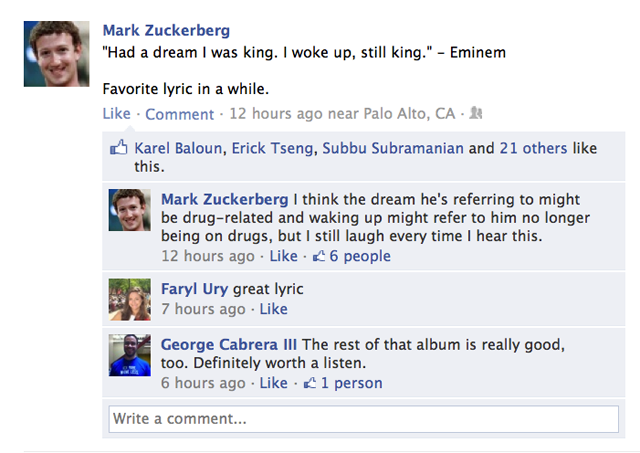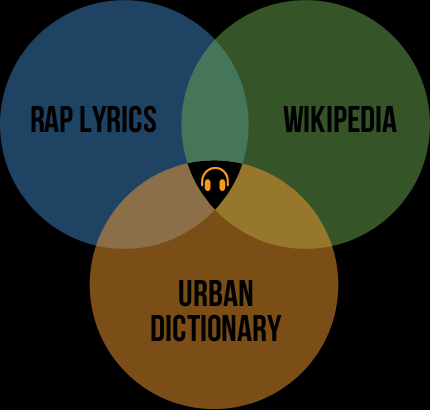Harnessing vicariousness
Lyrics have been powerful forms of expression for centuries. Ottaviano Petrucci, the 16th century Italian printer, is noted for being one of the first to capitalize on Gutenberg’s movable-type press by using it to widely distribute printed lyrics.
Lyrics possess more than just entertainment value: They are an age-old form of emotionally charged social commentary, channeling the desires and frustrations of the masses. Many of the decade’s standout songs discuss the War on Terror and other contemporary issues, all of which serve as a communal fire-pit on services like RapGenius or TuneWiki. Referring to lyrics as a “low-key, persistent background noise of everyday life,” TuneWiki’s Hritz draws attention to the millions of t-shirts, artwork, and even body tattoos that quote lyrics.
Beyond mass communication, lyrics also help individuals share their own ups and downs. Hritz believes that people use lyrics “in the same way they use greeting cards: To express themselves in ways they’re not articulate enough to do on their own.”
Mark Zuckerberg himself best exemplified this recently when he posted an Eminem lyric as a Facebook status update, “Had a dream I was king. I woke up, still king.” Zuckerberg, not particularly renowned for his social aptitude, channeled Eminem to project his emotional state.
Clearly, the vicarious power of lyrics enable a type of communication-by-proxy that firms must tap into if they’re to successfully implement different business models around this type of content. Case in point: the follow-up comments to Zuckerberg’s post were all related to how good Eminem’s album was.

Sharing is caring
Despite all signs pointing to how lyrics are destined for sharing, existing services still haven’t gotten the memo. RapGenius’ Lehman points to incumbents’ ban on copy-pasting as a telltale mark of their cluelessness.
But can lyrics compare to the power of sharing photos and videos through web and mobile apps? Can these firms become the “Instagram of lyrics” in a sense?
Lehman believes that the opportunity for people to share their explanations and personal interpretations with their social network may drive similar forms of engagement that Instagram and others have witnessed in the past year. By empowering their users to turn ordinary photos into contextualized pieces using avant-garde and retro filter effects, the same is being done with lyrics through analysis and debate.
Sizing up the market
Hritz sees the re-emerging lyrics vertical as part of three broad markets, the online advertising market, the games market and the digital music market. All told, the intersection encompasses tens of billions of dollars in global market opportunity. Getting more specific about where the rubber meets the road, he says, “Lyrics lead to recommendations which lead to purchases, not to mention the trickle-down transactions of concert ticket sales and merchandising.”
Referring to the search query demand commanded by lyrics, Hritz touted some back-of-the-envelope math to demonstrate the market size, saying, “iTunes is a billion-dollar business. Two to seven percent of that is 20 to 70 million dollars. Any firm that delivers real value for consumers in this space and grabs even a small percentage of that will grow rather quickly.”
By these estimates, the market is vast, and even Hritz, who’s “a big fan of RapGenius” feels the pool is large enough for many swimmers, believing that “it’s not a zero-sum game.”
Lyricize to Monetize
The market size is extensive, but these services will still face a problem faced by many consumer web businesses: How do you make money without compromising the consumer experience?
On this front, both Lehman and Hritz strongly agree that the tasteless display ad model of incumbent sites must be abandoned, but while RapGenius is deeply hesitant about an ad-based model, TuneWiki still sees a way for lyrics 2.0 to drive ad revenue without being obtrusive.

Hritz still believes there’s room for advertising if done properly. He emphasizes, “MetroLyrics is a bit heavy-handed with ads, which I don’t see TuneWiki following, but I don’t see us trying to recreate the wheel either.”
Pointing to the success TuneWiki has seen with video interstitial advertisements in its Lyric Legends game, Hritz is confident there’s a proper balance between ads and transactions to drive revenue without compromises on the user front.
The key is engagement, and he references the desire for brands to target users that are highly engaged with services, just like the activity on RapGenius. “Banner ads don’t work because they don’t create engagement,” he says.
RapGenius itself has considered other models, including a possible premium version of the site or creating sponsored pages for artists and labels to generate buzz. Songs can already be previewed on each lyrics page, with iTunes links readily available for those engaged enough to make a purchase.
TuneWiki is taking other models very seriously as well, focusing on developing a trusted, branded experience, not just for the consumer, but also for the industry. Hritz is adamant about artists getting a cut of the revenue, citing “meaningful artist participation” as key to both the consumer experience as well as the musicians’. He aims to have artists discuss their material, revealing their own interpretations and takes on lyrics.
musiXmatch, a European startup in the lyrics space founded in 2010, is betting on a premium model. It’s built a legally licensed lyrics database of over 5.5 million songs (translated to 18 languages) as well as an API for easy distribution to other music services. Earlier this week musiXmatch debuted a Mac OS X lyrics app that plugs into iTunes and Spotify. For $5, users can download the plug-in from the App Store and avoid all the headaches of the incumbent services. They’re betting on a premium strategy with an emphasis on cleanly acquired and distributed lyrics that seems to be doing quite well: over 1 million copies of their mobile app have been downloaded across iOS, Android, Symbian and Windows Mobile platforms.
Existing sitess could conceivably take note of the recent disruptors and try to implement some of the features themselves. However, the odds of them reversing course on their current business model are low. Meanwhile, startups are trying to reinvent the business.
The dilemma for incumbents is very real, but only time will tell how they’re able to hold on to their piece of the large music services pie.


